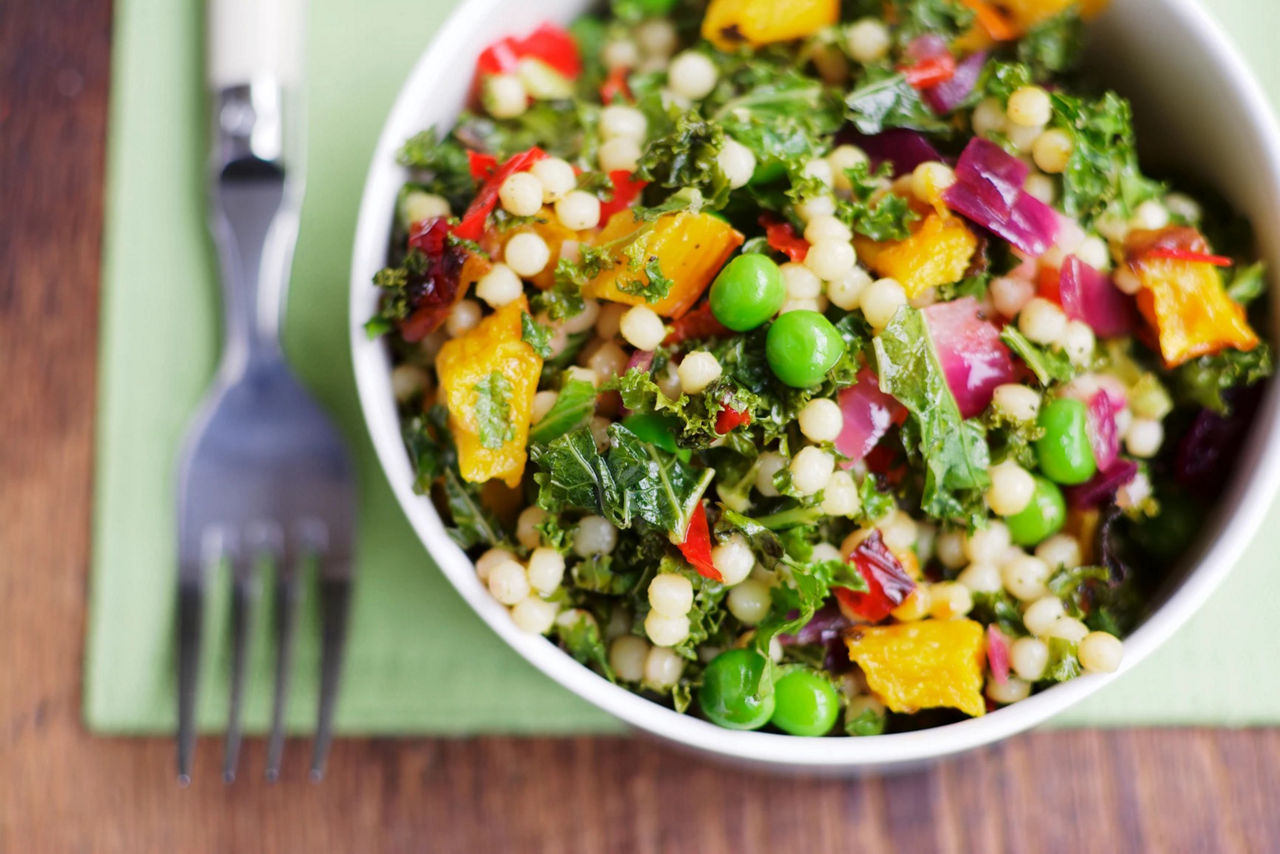From staying well hydrated to eating a healthy balanced diet, the nutritional choices you make while breastfeeding enable your baby to get the vitamins and minerals they need to support their future health.
Breastfeeding diet

And it’s not just your baby who will benefit from the food choices you make. Eating well, and eating the right amount, both during pregnancy and while breastfeeding, can help you get the energy and nutrients you need for your parenting journey and could help to maintain your milk supply1.
All of your baby’s nutrition comes directly from your breast milk2 . That means every crunchy salad, every flavoursome curry and every tuna steak you eat provides them with the vital vitamins they need as they grow and develop. And since your baby will taste what you taste, a balanced and varied breastfeeding diet may make them more adventurous when it comes to weaning3.
With our knowledge and expertise in early life science, here you’ll find a wealth of information about the kinds of foods you could include in your breastfeeding diet.
Breastfeeding foods
You don’t need to specifically change your diet if you’re breastfeeding4 unless you’re advised to do so by a medical professional. The key is to ensure that you’re eating a variety of different foods that provide all the vitamins, minerals and nutrients that you and your baby need.

When it comes to the best foods for breastfeeding, luckily there are a lot of things that are both delicious and nutritious that you could include in your breastfeeding diet. For example6:
- At least 5 portions of fruit and vegetables each day. These can be fresh, frozen, dried or tinned.
- Starchy foods such as wholemeal bread, pasta, rice and potatoes.
- Plenty of fibre which you can find in wholegrains, pulses, fruit and vegetables.
- Lean meat, poultry and fish for protein.
- Dairy products such as cheese, milk and yoghurt, or dairy alternatives if you follow a vegetarian or vegan diet, which contain plenty of calcium.
- At least 2 portions of fish each week, including a portion of oily fish.
You should also ensure that you’re drinking plenty of fluids whilst you’re breastfeeding so that you stay well hydrated.
Foods to help with breastfeeding
There are lots of theories and ‘old wives tales’ about which foods can help with breastfeeding and increase your milk supply. For example, pumpkin7, protein rich foods8 such as chicken eggs and seafood, and fennel9.
However, research in this area is limited and there’s no solid evidence to suggest that any specific foods will help with breastfeeding or your milk supply.
Snacks for breastfeeding
Ideally, the best snacks for breastfeeding shouldn’t only be healthy, delicious and full of energy, they should also be easy to make so that you can spend less time preparing and more time with your baby.
Some breastfeeding snack ideas include10:
- Fresh fruit.
- Baked beans on toast or a baked potato.
- Muesli and other wholegrain cereals.
- Hummus with bread or vegetables sticks.
- Milky drinks or a glass of unsweetened fruit juice.

Vitamins while breastfeeding
There are lots of theories and ‘old wives tales’ about which foods can help with breastfeeding and increase your milk supply. For example, pumpkin7, protein rich foods8 such as chicken eggs and seafood, and fennel9.
However, research in this area is limited and there’s no solid evidence to suggest that any specific foods will help with breastfeeding or your milk supply.
Vitamin D when breastfeeding¹¹
Vitamin D, also known as the sunshine vitamin, is essential for normal bone development. Due to a lack of sunlight in the UK, the NHS advice is to take 10 micrograms a day in order to reduce the risk of your baby developing bone problems such as rickets.
You can get these vitamins using healthy start vouchers (ask your GP if you are eligible for these) or ask your GP for a prescription as you can get these for free for 1 year after having your baby.
Vitamin A while breastfeeding
It’s recommended that you incorporate between 1,200 and 1,300 mcg if you’re breastfeeding your baby12. It’s likely that you’ll get this from your regular diet, as vitamin A is found in foods such as green leafy vegetables, milk, cheese and eggs.
Consuming too much vitamin A can be harmful and you shouldn’t take additional vitamin A supplements unless advised to do so by a doctor.
Vitamin C and breastfeeding
If you’re eating a varied and well balanced breastfeeding diet, you should be getting all of the vitamin C you need. It’s found in a number of foods including potatoes, peppers and strawberries13.
There’s no need to take an additional vitamin C supplement, and it’s important to discuss this with your doctor or midwife if you’re worried about your levels of vitamin C.
Breastfeeding if you have food poisoning
If you get food poisoning whilst you’re breastfeeding your baby, there’s no need for you to stop.
The bacteria that causes food poisoning are not passed to your baby through your breast milk, and the Centers for Disease Control and Prevention (CDC) advises that breastfeeding continue, whilst at the same time increasing your fluid intake14.
Food poisoning can be a tough experience, especially when caring for a new baby, so it’s important to take care of yourself. Make sure that you’re getting the rest you need, drink plenty of fluids and seek the advice of your doctor if you don’t start to feel better after a couple of days.
Losing weight while breastfeeding
Your breast milk will be providing everything your baby needs nutritionally to grow. So you’ll need to ensure that your breastfeeding diet contains all of the nutrition you need to help you and your baby stay healthy.
Whilst breastfeeding burns approximately 500 calories a day15, and therefore may help you to lose any weight gained during your pregnancy16, it’s more important for you to focus on nourishing yourself and your baby with a healthy, balanced diet. In fact, restricting your diet whilst you breastfeed isn’t recommended, and you should always discuss any change to your diet with your doctor or midwife.
Foods to eat while breastfeeding to avoid colic
There’s no firm evidence to suggest that eating or avoiding particular foods will avoid your baby suffering from colic, although some women have found that reducing the amount of spicy food, caffeine and alcohol they consume has made a difference17.
It’s important not to make any changes to your diet without first speaking with your doctor or health visitor, particularly if you think that your baby could have a milk allergy or intolerance.
Breastfeeding diet to avoid reflux
Reflux in babies happens when they bring up milk during or shortly after a feed. It can occur in both formula and breastfed babies, and there’s no evidence to suggest that the foods you eat while breastfeeding will help to avoid it.
The NHS advises against changing your diet to avoid reflux, and it’s best to discuss your options with a GP or pharmacist if you need advice and support.
You can read more about reflux in babies here.
Being a vegetarian or vegan and breastfeeding
If you’re breastfeeding your baby and following a vegetarian or vegan diet, there are a few things you’ll need to consider to make sure you’re getting the right amount of vitamins and minerals on a daily basis.
You’ll need to eat foods containing iron and vitamin B12, nutrients that are usually found in meat and fish. However, if you’re vegetarian, you’ll be able to source your iron and vitamin B12 from eggs, milk, yoghurt and cheese, as well as other plant-based sources. These foods also contain vitamin D and calcium, which are very important in a breastfeeding diet.
A vegan diet for breastfeeding mothers must also include an adequate intake of vitamin D, calcium and iodine18.
Iron while breastfeeding
Good sources of iron include dark green vegetables, wholemeal bread and flour, pulses and nuts. For your vitamin B12 intake, look to consume plenty of unsweetened fortified soya drinks, yeast extract spreads such as Marmite and fortified breakfast cereals.
Vitamin D while breastfeeding
When it comes to getting enough vitamin D, this can be difficult, since it’s only found in a limited amount of foods. You should be able to get the amount you need from sunlight during the summer months. However, the UK government recommends that all adults (including those who are breastfeeding) should consider taking a 10 mcg vitamin D supplement during the winter months.
Calcium while breastfeeding
Good sources of calcium in a vegan diet include sesame seeds and tahini, unsweetened soya, pea and oat milk, calcium set tofu and dark green leafy vegetables.
Iodine while breastfeeding
If you follow a vegan diet, you may need to eat foods that are fortified with iodine to ensure that you’re getting the right amount. For example plant-based drinks, grains and cereals. The level of iodine in these foods can vary however, so it may be that you’re advised to take an iodine supplement by your doctor.
Can you follow a keto or low-carb diet while breastfeeding?
The best kind of diet when you’re breastfeeding is one that’s varied and balanced, and very little research has been done on the impact of following a keto diet while breastfeeding. As such, it’s important that you discuss this with your doctor if it’s something that you’re considering, in order to get the correct advice and information.
Following a dairy free diet when breastfeeding
If you or your baby have been diagnosed with lactose intolerance or a milk allergy, you may be advised by your doctor to follow a dairy-free diet, including when you’re breastfeeding. There’s no need to follow a dairy-free diet unless advised by a doctor or other medical professional, and dairy is a good source of many nutrients such as calcium and protein.
There are a number of dairy-free foods that you can eat to ensure you’re getting the right nutrients in your breastfeeding diet. These include19:
- Oat and nut milks such as almond or cashew.
- Calcium-set tofu.
- Green leafy vegetables.
Luckily, the range of dairy-free alternatives available in supermarkets has grown in recent years, so there’s plenty of options. Look out for foods with the ‘suitable for vegans’ sign or those that state they’re ‘dairy-free’.
Milk protein allergy and breastfeeding diet
If your baby has been diagnosed with a cow’s milk allergy, breast milk is still the best form of nourishment for them.
Although it’s possible for cow's milk protein to pass to your baby through breast milk20, in most cases, babies with a cow’s milk allergy can tolerate it. Sometimes, however, your baby may react to the cow’s milk protein in your breast milk and this might result in your doctor advising that you remove dairy products from your breastfeeding diet and take additional supplements.
How many litres of water should you drink while breastfeeding?
Breastfeeding can be thirsty work. Keep a large glass of water next to you while you feed to keep your thirst quenched and your hydration levels as they should be. Drinking fluids is extremely important for maintaining your breast milk production21. For this reason you should aim to drink 2 litres, or 8 glasses, of water a day. Whilst water is the very best for hydration, you can include milk and fruit juice too.
Too much strong tea and coffee should be avoided as small amounts of caffeine can be passed on to your baby. Alcohol should also be avoided as it can pass into your milk.
Can I drink detox tea while breastfeeding?
It’s best to avoid drinking any kind of detox tea while breastfeeding. That’s because some varieties are diuretics which can increase the risk of dehydration. They can also contain caffeine.
It’s best to stick to a healthy, balanced diet when breastfeeding to ensure you’re getting all of the vitamins and minerals you need, as well as doing some regular physical activity if you feel up to it and that suits your fitness levels.
The Science eessential fatty acids, powered by Nutricia
Research shows that the essential fatty acids Omega 3 and Omega 6, which are found naturally in breast milk, are important for the development of your baby’s brain, eyes and nervous system22. Eating foods that are rich in Omega 3 and Omega 6, such as salmon, mackerel, sardines and tuna, or nuts and seeds, can encourage your baby’s visual, sensory and cognitive development.
While Danish pastries, biscuits and chocolate might satisfy a sweet craving, foods high in sugar and calories often lack nutritional value. For a longer-lasting energy boost, try a handful of sunflower or pumpkin seeds with raisins, cranberries or goji berries.
Or, for something more substantial, choose a wholemeal pitta filled with salad and either lean meat, salmon, sardine or grated cheese; a bowl of high-fibre, fortified cereal with milk; or fresh fruit and yoghurt.
related articles
Learn more about breastfeeding

Need some help?
You can get quick answers to common questions in our FAQs.
Alternatively, if you need help with general pregnancy or baby advice, or maybe on using or ordering our products - our expert team are always on hand to talk about feeding your baby.
- Amir, L., & Donath, S. Early Hum. Dev., 2012;88(7):467-471.
- Aaltonen, J., et al. Eur J Clin Nutr, 2010;65(1):10-19.
- https://www.nhs.uk/conditions/baby/breastfeeding-and-bottle-feeding/breastfeeding-and-lifestyle/diet/
- https://pubmed.ncbi.nlm.nih.gov/28609178/
- https://pubmed.ncbi.nlm.nih.gov/28609178/
- https://pubmed.ncbi.nlm.nih.gov/28609178/
- https://www.ncbi.nlm.nih.gov/pmc/articles/PMC4165197/
- https://www.nhs.uk/conditions/baby/breastfeeding-and-bottle-feeding/breastfeeding-and-lifestyle/diet/
- NHS– Breastfeeding and diet -Your pregnancy and baby guide [Online] Available at: https://www.nhs.uk/conditions/pregnancy-and-baby/breastfeeding-diet/ [Accessed December 2019]
- https://ods.od.nih.gov/factsheets/VitaminA-Consumer/
- https://www.nhs.uk/conditions/vitamins-and-minerals/vitamin-c/
- https://www.cdc.gov/breastfeeding/breastfeeding-special-circumstances/maternal-or-infant-illnesses/food-illness.html
- Guidelines for perinatal care. 7th American Academy of Pediatrics and the American College of Obstetricians and Gynecologists; Washington, DC: 2012.
- Jarlenski, M. et al. Preventive medicine, 2014;69:146–150
- https://www.nhs.uk/start4life/baby/feeding-your-baby/breastfeeding/breastfeeding-challenges/colic/
- https://www.nhs.uk/pregnancy/keeping-well/vegetarian-or-vegan-and-pregnant/
- https://www.nhs.uk/live-well/eat-well/food-types/milk-and-dairy-nutrition/
- National Health Service (NHS). What should I do if I think my baby is allergic or intolerant to cows’ milk? [online] 2019. Available at https://www.nhs.uk/common-health-questions/childrens-health/what-should-i-do-if-i-think-my-baby-is-allergic-or-intolerant-to-cows-milk/. Accessed August 2022
- Morse, J., et al. Can J Public Health., 1992;83(3):213-6.
- European Food Safety Authority Panel on Dietetic Products, Nutrition and Allergies. Scientific opinion: DHA and ARA and visual development. EFSA Journal 2009;941:1-14.
Last reviewed: 22nd September 2022
Reviewed by Nutricia's Medical and Scientific Affairs Team



